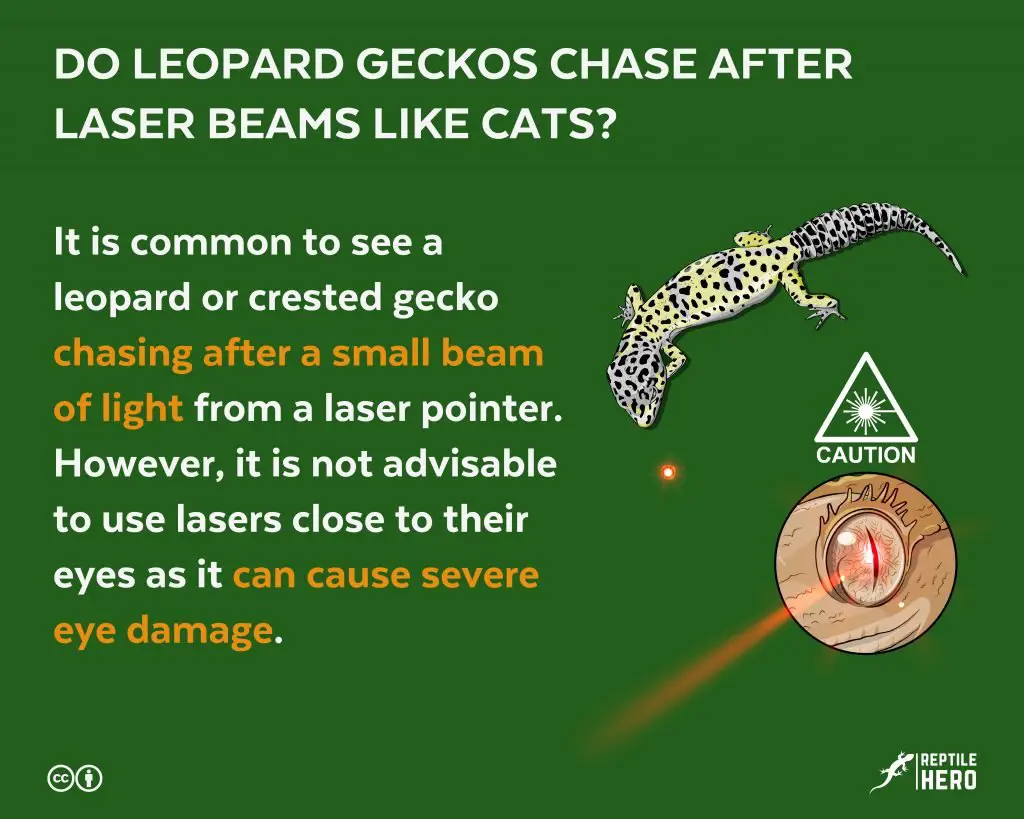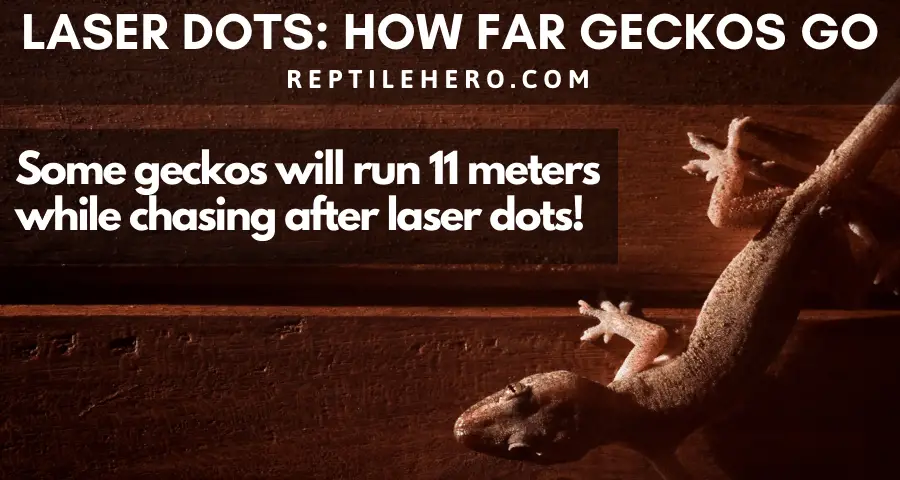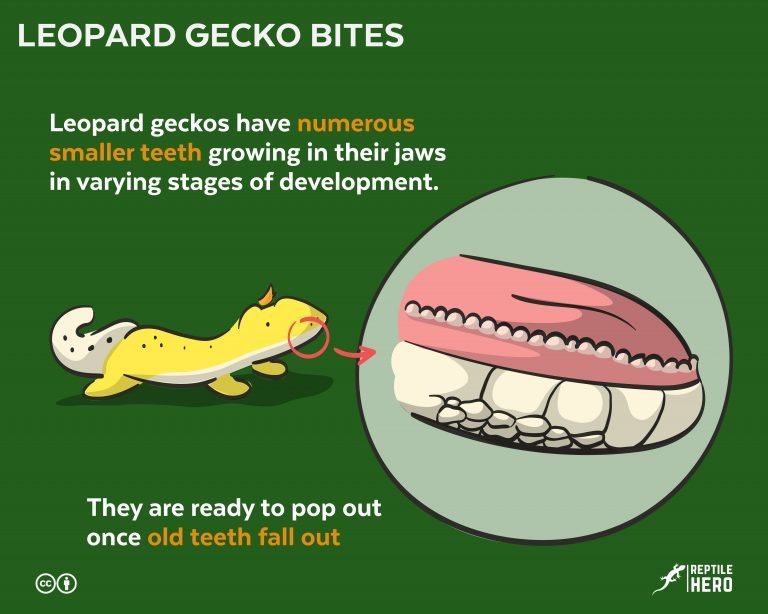Do Leopard Geckos Chase After Laser Beams Like Cats?
Have you ever noticed your soft-scaled geckos stalking after the laser from your infrared thermometer gun? Is it just mere coincidence or does the fact that some leos quickly give chase after seeing it prove such claims otherwise? Well, you don’t have to try it out yourself to find out!
It is not uncommon to see a leopard gecko chase after the small beam of light that a laser pointer produces. Other species, such as crested geckos, have also been reported to do this. However, it is not advisable to intentionally use lasers close to their eyes for play as it can cause severe eye damage.
Many pet owners find it amusing to watch their furry babies run after lasers in a frenzy, and this is probably why companies have started marketing laser pointers for playing with pets. So is it okay to play with your geckos using lasers?
Will Leopard Geckos Follow the Laser Light?
Keepers and breeders of leopard geckos (Eublepharis macularius) have reported and documented instances where geckos actively chase after the light beams from regular laser pointers and built-in lasers in temperature guns.
There is no clear number as to exactly what percentage of leopard geckos will take notice and chase after the laser dots from pointers and infrared thermometer guns like this one from Amazon.
Honestly, I haven’t personally seen my baby do this since I make sure to only check his vivarium for temperature readings when he isn’t near the area or he isn’t awake. Call me paranoid, but I like to avoid accidentally hitting his eyes with the laser at all costs. Many of my friends and acquaintances, on the other hand, have seen their leos do it – do note that they don’t intentionally use it to bond or play with their reptile pets.
From all the stories I have read and heard, it is quite apparent that the majority of our adorable rock-climbing geckos will voluntarily go after these small and intense beams of light as long as they stay within their range of vision. Even when they are all cuddled up in their cozy hides, I have seen that other leos will actually come out and stalk after it like prey.

Other gecko species that have been documented by regular pet owners and scientists [1] to follow laser lights include the following:
- Crested gecko (Correlophus ciliatus)
- African fat-tailed gecko (Hemitheconyx caudicinctus)
- Gargoyle gecko (Rhacodactylus auriculatus)
- Pacific gecko (Gehyra mutilata)
- Spotted house gecko (Hemidactylus brookii)
- Asian house gecko (Hemidactylus frenatus)
- Common dwarf gecko (Hemiphyllodactylus typus)
- Blue-tailed day gecko (Phelsuma cepediana)
- Mauritius ornate day gecko (Phelsuma ornata)
However, this doesn’t mean that every single leopard gecko will go crazy over laser pointers. Some geckos will continuously run after lasers every single time they see it. Others stop following it after realizing that it isn’t actually from a juicy live insect they can eat. Still, a few others would ignore it completely or run away at the sight of it.
Why Do Geckos Chase After the Laser from Pointers?
Expert keepers and researchers have presented three possible reasons as to why geckos pursue laser beams:
- Survival “fight” instinct
- Out of curiosity
- Foraging response
Keep in mind that this phenomenon is not a widely researched topic so it is possible that all three of the previously listed theories may explain why geckos follow laser dots.
If this is only done as an instinctual behavior, a defense mechanism against something unfamiliar, the gecko would have stopped running after the laser upon realizing that it is harmless. The same thing goes for the curiosity theory – once the novelty wears off, the gecko will most likely stop wasting its energy and pay it no mind.
Nonetheless, the theory of geckos hunting down laser lights as a foraging response makes the most sense to me. I think you would agree if you see exactly how geckos react to lasers aside from giving chase.
You will see that the gecko will follow it intensely, swerving its head around to make sure the laser dot stays within its line of sight – as this is the most vital sense for capturing prey in geckos [2]. Then, when it is within reach, it will pounce on the laser light and try to take a bite of it.
How Far a Gecko Will Go to Follow (and Try to Eat) the Light
Fun fact: in the early 2000s, a researcher from the United Kingdom developed a novel way of safely capturing lizards, arboreal geckos, in particular, using a laser pointer based on the premise that geckos – which are largely opportunistic feeders in the wild – will attack any moving object that is small enough to fit inside its mouth, including a small beam of laser [1].
So what did that study find?
More than 90% of all 94 diurnal and nocturnal gecko species he tested intently ran after the laser dot. As a matter of fact, 5 geckos were so keen on capturing it and eating it that they continued lunging after it for up to 11 meters (36 feet).

Is It Safe to “Play” with Your Geckos Using Lasers?
Using a laser pointer to engage in play with a gecko is neither recommended nor safe because even short exposure of the laser beam to its eyes – whether direct or reflected – can lead to significant visual impairment, if not blindness. Hypothetically speaking, it could also lead to the development of negative and unproductive behaviors.
With the fairly recent discovery of our precious geckos’ penchant for chasing after light beams from laser pointers within the reptile-keeping community, I have come across a few incredibly concerning articles encouraging newbie pet parents to “play” with their geckos using their temp guns.
Some even go so far as to instruct gecko owners to purchase supposedly pet-safe laser pointers. Even worse, they give vague directions when it comes to safely using lasers in general and keep readers in the dark about the dangers that come with their use.
Laser pointers – regardless of their light’s actual color – can cause serious eye damage even if exposure is not longer than a minute [3]. Keep in mind that laser pointers are made specifically to concentrate their light into a very thin beam that can precisely point out objects. The laser pointer of a thermometer gun, for example, allows you to confirm that you are accurately measuring the temperature of the slate tile and not the substrate in your gecko’s enclosure.
However, even very brief exposure to lasers that have relatively low output power (more than 5 milliwatts) can easily result in substantial retinal damage and permanent visual impairment.

Unfortunately, more or less 60% of readily available laser pointers tested by the U.S. Food and Drug Administration (USFDA or FDA) are not labeled properly or correctly. A small laser pointer, no larger than your pinky finger, that is labeled to be only 5 milliwatts could very well be 100 milliwatts in reality.
Aside from this, regular laser-pointer play with larger animals, mainly cats and dogs, has caused behavioral issues such as over-reactivity to light in general and increased aggression [4]. Sure, there is a chance that geckos will not display similar problems, but I don’t think it’s worth your time and effort to disprove this.
Do Geckos Even Actually Play?
Though it is not 100% conclusive, experts mostly believe that geckos do not engage in play behavior as they are ectothermic animals that need to conserve much of the energy they are able to obtain. Most actions pet owners see as playful are, in reality, natural and functional behaviors.
Since we are already on the topic of play, we should also carefully consider whether or not geckos are capable of playing in the first place. Mammals and birds are known to engage in play, however, the situation for reptiles is quite the opposite [5].
In fact, even when dubbed as “playful” behavior, geckos may simply be engaging in exploratory and investigative behavior. For instance, if you see them moving actively around their enclosures – climbing, burrowing, and jumping around – they may simply be looking for a good hide, trying to adjust their core temperature, or looking for food.
It is also important to always remember that geckos are ectothermic creatures. They are primarily solitary creatures with a considerably slow metabolism that do not normally move about for any reason other than to look for shelter, find a mate, and hunt food.
So unless you have been overfeeding your baby to the point that it has become obese, you won’t have to force it to move more than it needs. In the event that your gecko does need to lose weight, let it naturally stalk and capture its insects as it would in the wild – train it.
Takeaways
Leopard geckos, along with other species, have been observed chasing after the light beams of regular laser pointers and infrared temperature guns.
There are three possible reasons why geckos follow laser dots: 1) fight instinct, 2) curiosity, and 3) prey hunting.
It is not safe to play with geckos using laser pointers because exposure can cause visual and behavioral issues. Moreover, geckos do not normally engage in play behavior as they need to save their energy reserves.
Sources
[1] https://www.researchgate.net/publication/277667220_A_novel_technique_for_capturing_arboreal_geckos
[2] https://www.jstor.org/stable/1564162
[3] https://www.aao.org/eye-health/news/laser-pointer-eye-injury



![5 Steps To Calm Down A Gecko [+4 Simple Tips]](https://www.reptilehero.com/wp-content/uploads/2021/12/calm-down-gecko-cc-768x614.jpg)


![Choose the Right Thermostat for Your Gecko Tank [7 Factors]](https://www.reptilehero.com/wp-content/uploads/2021/09/choose-gecko-tank-thermostat-small-cover-infographic.jpg)
